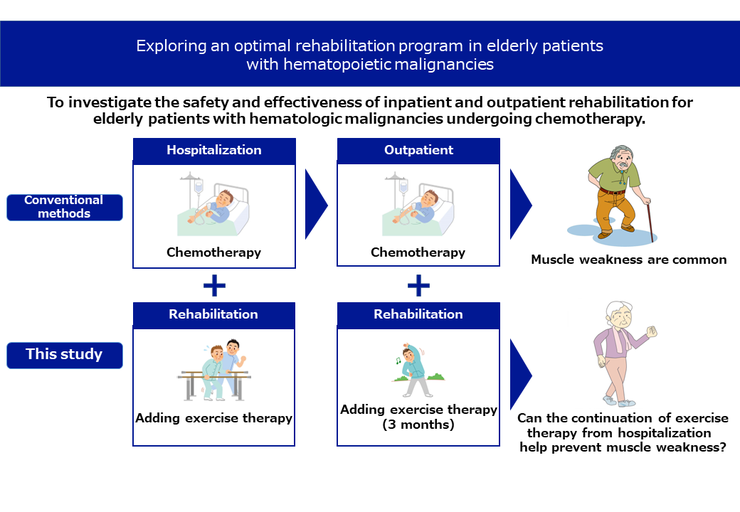Exploring an optimal rehabilitation program in elderly patients with hematopoietic malignancies
Abstract
With the aging population, the number of cancer patients aged 65 and above is increasing. Furthermore, due to advancements in low side-effect medications, it is expected that the number of elderly patients receiving chemotherapy will further rise in the future. Elderly patients undergoing chemotherapy often experience decreased food intake, reduced physical activity, and weakened stamina due to side effects such as nausea and fatigue. As a result, there is often a need to reduce or discontinue chemotherapy, leading to limited effectiveness of the treatment in some cases. It is necessary to establish a program that focuses on rehabilitation before the decline in exercise capacity caused by chemotherapy occurs, in order to prevent the decline in physical strength and facilitate the continuation of appropriate chemotherapy. In this study, we will investigate the effectiveness and safety of a rehabilitation program for elderly patients with hematologic malignancies, which will be implemented at the National Center for Geriatrics and Gerontology.
The study will target patients aged 65 and above with hematologic malignancies who undergo chemotherapy. During the three months following hospital discharge, when patients come to the outpatient clinic for chemotherapy sessions, they will receive rehabilitation sessions. The rehabilitation program will include evaluation of physical functions such as lower limb muscle strength and balance, assessment of exercise performance at home, and guidance on exercise and daily activities. After completing the three-month rehabilitation period, the subsequent three-month period will serve as the observation period to track any changes in the patients' physical condition. To assess the effectiveness of rehabilitation and verify whether there are any changes in exercise capacity, mental and psychological functions, and other factors after completing the rehabilitation, assessments such as exercise performance and questionnaires will be conducted before hospital discharge, at three months post-discharge, and at six months post-discharge. Additional tests may be conducted as needed.
Perspectives
By implementing rehabilitation before initiating chemotherapy, it is possible to prevent a decline in physical strength and enable a greater number of patients aged 65 and above with hematologic malignancies to undergo appropriate chemotherapy.
Comments from principal researcher
With the aging population, there is an increasing number of patients aged 65 and above with hematologic malignancies who actively desire chemotherapy treatment. However, it is not uncommon for individuals to experience difficulties in their daily lives due to treatment-related fatigue and other side effects. We aim to contribute to improved healthcare by exploring safe and effective rehabilitation strategies that will enable patients to feel that undergoing treatment was worthwhile.

